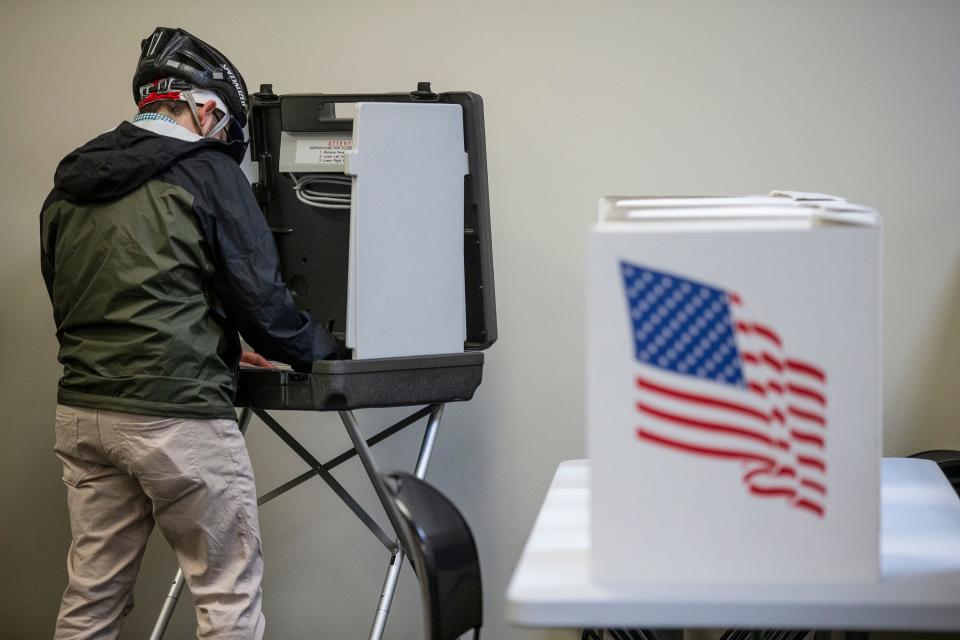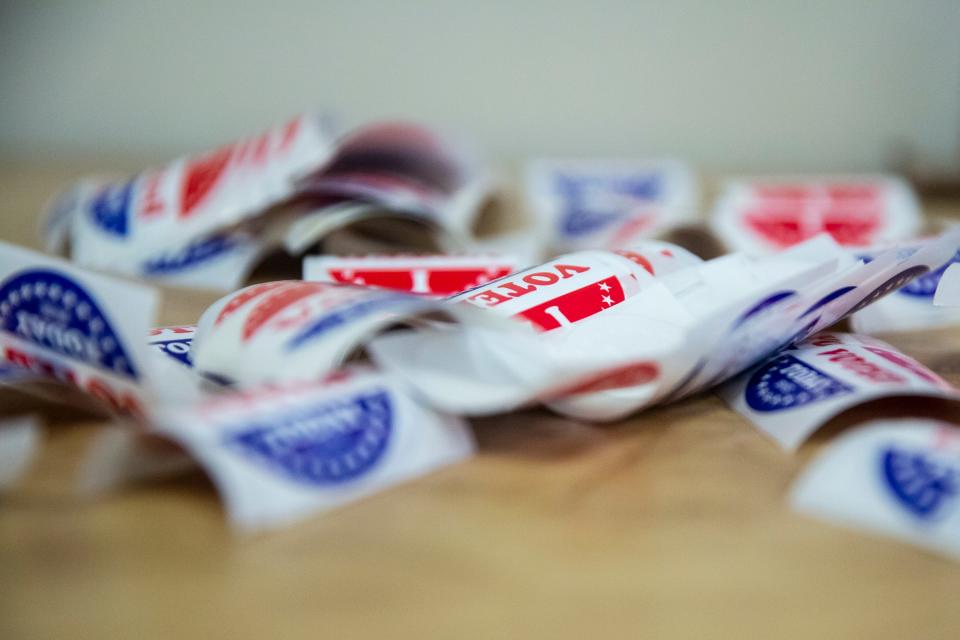Iowa voters adjust to shorter early voting window for June 7 primary election
Tom and Carole Chambers went out in a dreary May afternoon to cast their ballots at an early voting site in downtown Des Moines.
"It's quick and easy, it's convenient," Tom Chambers said. "No standing in line."
"Well, it's not always convenient coming downtown in the rain," Carole Chambers added, wind whipping past the Polk County auditor's office. "But, you know, I vote early every year."
She said she feels more assured of her vote being properly counted when she votes early.
Early voting began on May 18 for Iowa's June 7 primary election. Within the first week, more than 25,000 Iowans cast votes for their parties' nominees for local, state and federal offices.
Polk County Auditor Jamie Fitzgerald said the primaries are "candidate-driven elections." Fitzgerald, a Democrat, said redistricting and retiring incumbents in the Iowa Legislature made this year's primaries "a perfect storm" for activating voters.
"You're seeing a little more hustle in different parts of the town, and that generates enthusiasm, because those folks are all working," he said.
More: Iowa Democrats make their pitches in 3 deep-blue open legislative districts in Des Moines
For the Chambers, state Sen. Zach Nunn, one of three Republican candidates seeking the 3rd Congressional District seat, drew them to get out and vote.
"He's a stand-up, salt-of-the-earth patriot for our United States," Carole Chambers said. "I love the guy."
"Ditto," her husband added
Nunn is running in the primary against businesswoman Nicole Hasso of Johnston and activist and retired farmer Gary Leffler of West Des Moines for the chance to face Democratic U.S. Rep. Cindy Axne in November.
Des Moines southsiders Roger and Deb Elliott said they were interested in former Navy Adm. Mike Franken, a Democrat running for U.S. Senate. But mostly, they said voting early was a a way to avoid crowds on Election Day.
Franken is facing former U.S. Rep. Abby Finkenauer and rural physician Glenn Hurst in the primary. The winner will take on Republican U.S. Sen. Chuck Grassley in the fall.

How many people have voted early?
By the end of Wednesday — the first full week of early voting for the June primary — 25,920 Iowans had cast their primary ballots.
Fitzgerald estimated about 200 people had voted at the Polk County auditor's office each day. That's far fewer than the turnout ahead of the 2020 general election, when lines to vote early snaked out of the building and through the streets of downtown Des Moines.
Fitzgerald said the smaller turnout was to be expected for a midterm primary.
"You've got to remember, these are family fights," he said. "Democrats are talking to Democrats, Republicans are talking to Republicans for their nominee."
How has Iowa law changed early voting?
Early voting in Iowa looks significantly different in 2022 than it did in recent years.
In 2021, Republican lawmakers passed a sweeping elections bill that changed parts of the early and absentee voting process. The law shortened the early voting window from 29 days to 20 days, and now county auditors have a tighter timeline for sending out absentee ballots.
Voters who mail in their absentee ballots also face a new deadline: Ballots must arrive at the auditor's office by the time polls close on Election Day. Before the new law, auditors could accept ballots for several days afterwards, so long as the ballots were postmarked by a certain time.
Proponents of the legislation said the restrictions would strengthen election integrity. Democratic opponents worried it would make voting more difficult.
More: Iowa's voting laws have changed. Here's what you need to know before you vote.
New absentee ballot law presents new challenges, adjustments
The law took effect in March 2021, so this won't be the first election with the new rules. But representatives for the Polk and Dallas county auditors said the law presented some logistical challenges to voters and office staff.
If voters make an error on their request form, Fitzgerald said, auditor staff has less time to contact them.
"The chance to cure anything that you don't have right on your absentee ballot request gets tougher as each day goes by," he said.
The window to request an absentee ballot is also shorter. The deadline is 15 days before Election Day, rather than 11 days. Monday was the final day to request a mail-in ballot for the June 7 election.
Polk County tracked the voters who requested an absentee ballot for the 2021 election, but were too late to receive one. Fitzgerald said half of those voters didn't vote at all.

The 2021 law also prohibits county auditors from sending absentee ballot request forms to people who have not requested one. It's a departure from 2020, when the Iowa secretary of state sent an absentee request form to all Iowans as the COVID-19 pandemic was raging.
More: Iowa Supreme Court sides with GOP over absentee ballot forms
Danielle King, a senior elections clerk in Dallas County, said there were fewer absentee ballot requests for the 2022 primary, as people needed to seek out the form on their own. She said that presented an issue for some elderly voters.
"When people get stuff in the mail, especially elderly people that don't have social media and things like that, that's kind of their 'Oh, hey, I need to request this ballot' (reminder)," King said.
But King said the absentee return rate was better this year.
"We did have a lot more requests (in 2020), but a lot of those people, they just filled the form out and sent it in and didn't realize what they were filling it out for," King said.
Fitzgerald said, overall, voters were adjusting to the new rules and submitting their paperwork quickly for the primary.
"Given the restrictive nature of how long we had to mail ballots, we've had a lot of success with people getting their ballot and getting it back in quickly," Fitzgerald said.
What Iowans need to know about early voting
Iowa will hold its primary election on June 7.
Iowa has closed primaries — that means voters must register as a Democrat to vote in the Democratic primary, or as a Republican to vote for Republicans.
But it's easy to change party registration. If you vote in-person and you request a ballot for a certain party, you will be automatically registered as a member of that party.
Can I still request a mail-in ballot?
No. May 23 was the deadline to request an absentee ballot via mail.
When do I have to mail my completed ballot?
Under Iowa law, county auditors must receive ballots by the time polls close on June 7.
The United States Postal Service recommends mailing ballots at least one week before Election Day. For Iowa, that means getting ballots in the mail by Tuesday, May 31.
The Secretary of State website tracks absentee ballots online.
If you don't want to mess with the mail, absentee ballots can also be dropped off in person at your county auditor's office.
How can I vote early in person?
County auditor offices will be open through June 6 for early voting. Voters can check with their county auditor for hours.
More: How to vote early in Iowa's 2022 primary elections from registration to voting locations
Katie Akin is a politics reporter for the Register. Reach her at kakin@registermedia.com or at 410-340-3440. Follow her on Twitter at @katie_akin.
This article originally appeared on Des Moines Register: Iowa primary election: Early voting begins with new legal restrictions

